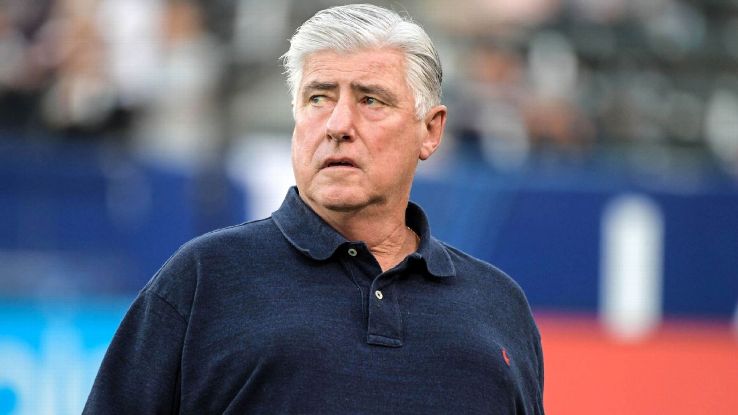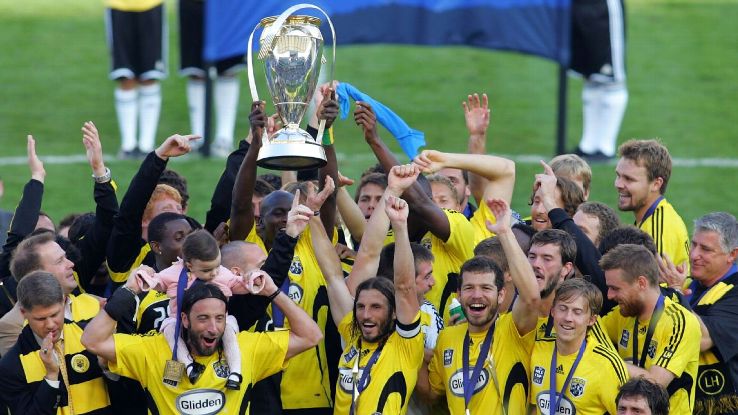
In the spring of 2000, Jimmy Conrad was carrying a heavy burden. His stepfather, Rob Doty, was dying of cancer and with his family based in Southern California, an upcoming match at the Rose Bowl between Conrad’s San Jose Earthquakes and the LA Galaxy was set to be the last time he would be able to play in person in front of his ailing stepfather.
There was one problem, and it was a big one. Conrad was suspended for the game due to yellow card accumulation. So the defender called up his old college coach, Sigi Schmid, then-manager of the Galaxy, and made a most unusual request. Would Schmid agree to delay Conrad’s suspension until a Clash-Galaxy game later in the season so he could play in the upcoming match? Schmid not only agreed but he helped make it happen with league administrators. As it turned out, it was the last time Doty saw Conrad play, as he died later that summer.
On Tuesday, Conrad’s heart was heavy again. Schmid passed away at age 65, while awaiting a heart transplant. And in addition to a loving family that included wife Valerie, sons Kurt, Kyle and Eric, as well as daughter Lacey Nicholl and several grandchildren, he left a host of players whose careers and lives were impacted by his work, Conrad among them.
“What I really liked about him was that he was human,” said Conrad via telephone about Schmid. “If you had a personal thing going on, he was very sensitive to that. He had a big heart and when you strip everything away, I hope that’s what people will remember him for.”
They will remember him for so much more than that. More than anything, Schmid was a builder, whether it was teams, organizations or even the sport in general.
At the collegiate level, Schmid won three NCAA championships with UCLA over 19 seasons. He led the Galaxy to its first MLS Cup in 2002, as well as a Supporters Shield and an U.S. Open Cup title. He later led the Columbus Crew to an MLS Cup/Supporters Shield double in 2008. That team was led by the MVP season of Guillermo Barros Schelotto. It’s more than fitting that it is Schelotto who will reportedly take up the managerial reins with the Galaxy.
Schmid then went on to build the Seattle Sounders from the ground up and while another MLS Cup proved elusive, he won his third Supporters Shield and another four U.S. Open Cups with the Sounders.
ESPN TV analyst Alejandro Moreno played under Schmid in both LA and Columbus. It was that double-winning Crew team, and how Schmid went about building it, that is seared into Moreno’s memory.
“The makeup of that group was guys who had been misfits just about everywhere they had been,” said Moreno via telephone. “And Schmid was able to mold that team into Robbie Rogers being an outstanding player, Eddie Gaven being an outstanding player, Brad Evans becoming the player that he became, and Danny O’Rourke finding a place on the field where perhaps he didn’t find it before, Chad Marshall going from a potentially good player to a superstar in MLS.
“All those things come from somewhere, and you add to that a level of leadership and talent identification that Sigi was very good at. I think that’s one of the things for which he doesn’t get recognition for. His talent recognition was second to none.
“Then what he did in Seattle. It tells you he knew what he wanted out of players, and he knew what players would perform well and would play up to the standards that he set in front of them.”

But even more than building teams, Schmid was a builder of relationships. That is not to say he reached every player that he worked with. That’s not how coaching works. Schmid’s intensity was borderline legendary. But once you were in, you were in for good.
“You could just get that look from his eyes that he knew he liked you, that you knew he wanted you on the field, that he knew he could count on you to do the things that needed to be done in order to be successful as a team,” said Moreno. “Once you got that approval from Sigi — that’s hard to explain, that’s hard to describe — but that’s the kind of thing I’ll remember.”
Yet Schmid reached enough players and organization employees in a way that he was able to replicate success time and again at a variety of levels.
“He developed relationships with his players and was very cognizant of those relationships and how they came together to build an entire team,” said Mark McCullers, who served as the Crew’s GM during Schmid’s time there. “He also knew how important it was to build relationships in the front office. He formed relationships with the equipment managers and the doctors. He covered a lot of bases to get the results that he got.
“The one thing I learned from him was how important communication is in a coach. It’s maybe the most important skill.”
That relationship-building and generosity extended to his interactions with the media as well. It’s telling that Schmid was just as available to talk about his failures as he was his successes. He talked about when he got fired from the Sounders in 2016, including his eroding relationship with star forward Clint Dempsey — “Sometimes [the relationship] was productive and sometimes it wasn’t as productive as it needed to be.” He spoke about when he got fired from the Galaxy in 2018 — “It was probably the best decision.”
He even discussed one of the most gut-wrenching defeats in MLS playoff history, when in 2003 the Galaxy blew a four-goal aggregate advantage and lost 5-4 to arch rivals San Jose, admitting that he erred by not bringing on defender Alexi Lalas to protect a late lead.
Schmid’s successes will outweigh those setbacks. They do in the minds of those who played under him and against him. Moreno recalled that the last time he saw Schmid was back in June ahead of a 1-1 draw against the Portland Timbers. The two spent some time chatting about the season to that point.
“He was trying to scrape points together, get them to defend a little bit better — typical Sigi fashion,” said Moreno.
His voice trailed off, and then he said, “I love that man.”
Moreno isn’t alone. The sport loved Schmid, and he loved it back. The game in the U.S. is better off for his contributions.
